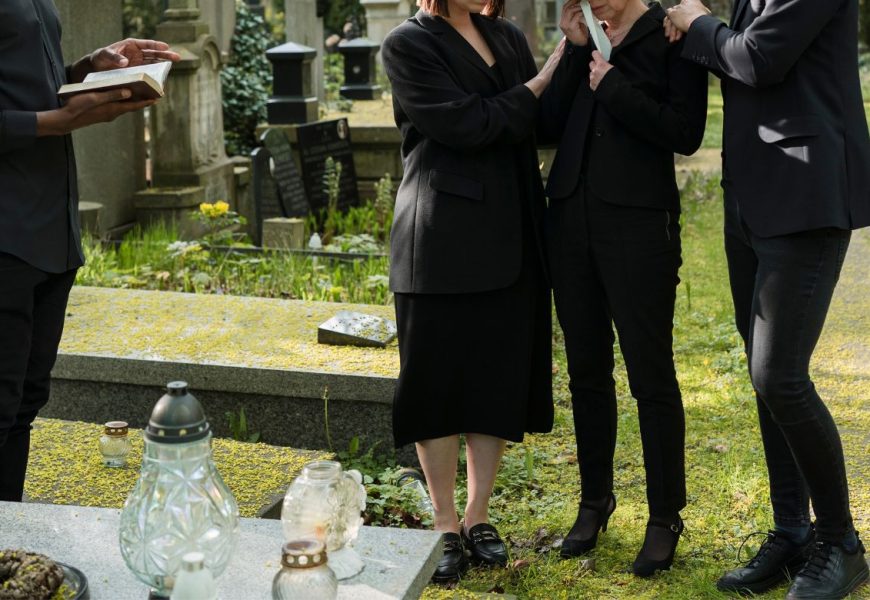You should perform every action and expression at a funeral with great consideration and respect. In short, funeral etiquette refers to those socially acknowledged behaviors, gestures, and expressions that pay tribute to the dead and respect the bereaved family. If done according to established guidelines, it might portray respect, comfort the family members, and ensure a smooth event.
The main etiquette to remember is showing condolence and support, sending flowers, and dressing properly. You should also be punctual and respect the customs of the grieving family. Do not forget to attend the reception, and respect the boundaries of the family after the funeral. Explore additional etiquette to observe during funeral services by reading more from the funeral homes in Oklahoma City, OK.
What is Funeral Etiquette, and Why is it Important?
Funeral etiquette involves the behaviors that reflect modesty, respect, and consideration for the deceased and their family, helping to support those who are grieving. This etiquette is important because it gives opportunities for a proper expression of sympathy, providing support for the bereaved family at this tough time. Funeral etiquette preserves the dignity of the occasion, which manifests kindness, empathy, and thoughtfulness among people.
Important Etiquettes To Consider
Before the Funeral
- Condolences and Support: After death, it is important to reach out to family members to condole their loss. A short card or letter or even a short call saying that you are sorry for their loss would be sufficient, but be careful not to hurt them by asking questions and providing support. If you are close to the family, ask them specific ways to serve them; you may cook meals, run errands, or serve in any way to prepare to make and arrange funeral preparations.
- Dress appropriately: You can wear any type of soft dress that aligns with the nature of the event. Wear black, gray, or navy-colored dresses and avoid bright casual ones. In fact, it reflects respect for the occasion and the people who are grieving.
- Sending Flowers or Contributions: Most families will gladly accept flowers or contributions as tributes to the deceased. While it is great to send flowers to the house or place at the funeral, some might prefer contributions to a chosen charity rather than flowers. Make sure to look for their preference, as they may want contributions to charities close to the deceased’s heart.
At the Funeral
- Be On Time: One should go punctually at a funeral. Try to get there earlier than the service time by 10 or 15minutes if not more then just find a seat and wait for the service to begin. Those who are usually late are not expected to disrupt the service; if this is your case, try to sneak into the service and sit at the back, where you do not attract the attention of the other members of the congregation.. Respecting the schedule is greatly appreciated by the family and the guests.
- Show Respect to the Traditions: Every funeral service should respect traditions and customs, especially if these are culturally or religiously mandated. You may attend at some point during the standing ritual, where you are praying or otherwise undergoing rites. From here, you may learn how other guests observe this situation or get instructions from the funeral organizer.
- Condolence to Family Members: Express your condolences to family members, but keep your discussions brief and respectful. A handshake with a few polite words usually suffices and comforts the family. For many families, merely your presence with a genuine expression of condolences and listening is enough.
After the Funeral
- Attending the Reception: Typically, a family holds a reception after the funeral as an opportunity for guests to visit and share memories of the deceased with each other. The reception is often important for support and association with the family. Attend responsibly and reflect on some positive memories of the deceased person, or sit quietly while others do the same.
- Revisit the Family: After the funeral, try to revisit the family so that they don’t feel alone in this tough time. This helps them feel good mentally and offers them comfort.
- Respect Boundaries: Everyone has their own way of dealing with loss and grief. Be mindful not to ask questions that may cause the family further distress. Sometimes, people want to keep the death details private, so avoid sharing anything on social media before asking them.
Conclusion
Funeral etiquette includes how to deal with funeral events. It involves how you act in front of the deceased’s family and how you comfort them during their time of grief. Make sure to show sympathy to the family for their loss and offer support and remembrance. You can always ask the funeral homes in Oklahoma City, OK, for professional guidance on funeral etiquette for better experiences.









